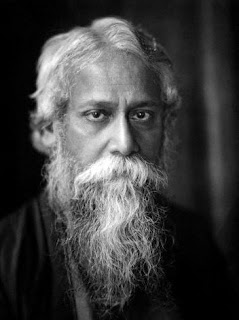"Tharini Chaturjye was a money lender in that place and when a new magistrate visits that place he would make a great parade of his public spirit in allowing school to be held in his house. Actually he does nothing for the schoolmaster except to provide his meals, and in return was making use of him to work till ten o'clock at night writing up Tarini's accounts ; his salary was paid out of school fees and the Government grant. He had a sister who was left penniless at her husband's death and to whom he had to give shelter in consequence. She was pregnant at the time and died in giving birth to a daughter. He had another widowed sister who did all the housework and so saved him a servant's wages. This poor creature took charge of the orphan, but she too died a few years later, as explained by my magistrate friend. The girl had been leading a dog's life ever since, slaving for uncle and aunt and getting nothing but scolding in return. She had nearly passed the marrying age, but it was no easy task to find a husband for a friendless orphan like her, especially as no one in the village knew her parents. She was a posthumous child too, and the village gossips whisper scandal about her origin. Tharini Chaturjye was notoriously rolling in wealth, so they depreciated the girl in the hope of squeezing a big dowry out of him before he can get her married. And yet, you know, she was a loveliest girl that I ever saw. She was called Kamala, after the goddess Lakshmi, and she was the perfect image of her namesake in every respect. My friend, being aware of my personal ideals and mental aspirations, suggested me to go in for marriage with that girl. Do you know, mother, I was in such a dare-devil mood that at once, without a moment's reflection, 'All right, I'll marry the girl.' I had always intended to give you a surprise by bringing you home an orthodox little Hindu daughter-in-law ; I knew quite well that if I married a grown-up Brahmo lady none of us would be happy. As I was told that this girl was of about fourteen years age I volunteered to marry her immediately. Bhupen was flabbergasted at my decision and revealed my intention to Tarini Chaturjye. 'I implore you to come to my rescue,' he said, 'see the girl for yourself ; then, of course, if you don't fancy her that's an end to the matter, but on no account listen to the misrepresentations of my enemies.' 'I don't require to see her,' I replied ; 'you can fix a day for the wedding.' 'The day after to-morrow will do,' said Tarini ; 'let us have it then.' Of course one could see the motive underlying his piteous appeal and his indecent haste ; he wanted to avoid a heavy outlay on the wedding festivities. However, the marriage duly took place."
"The marriage took place !" exclaimed in consternation ; "are you serious, Nalin ?"
"Perfectly serious, mother," replied Nalin, "we set off hiring a boat in the afternoon when one has every reason to expect fine weather. It was in the month of March. That evening, a couple of hours later, an intensely hot blast of wind descended on us and in some inexplicable way overturned the boat and left no trace of it."
"Gracious heavens !" ejaculated Kshemankari with a thrill of horror.
"When I regained consciousness a little later I found myself struggling in deep water and there was no sign of boat or of any of its occupants. I informed the police and a thorough search was made, but without result," explained Nalinaksha.




















